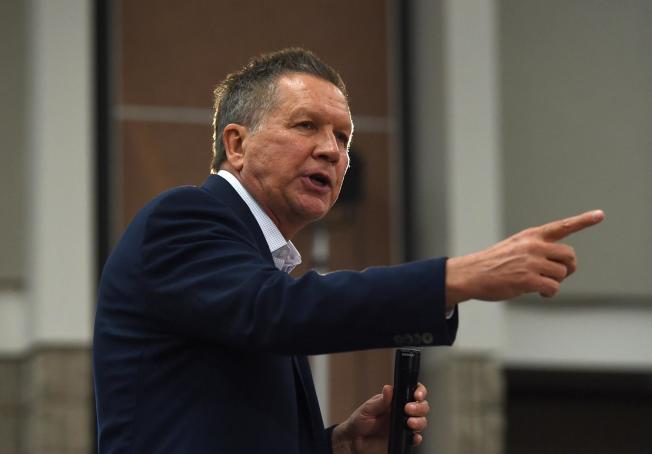
On Monday morning, John Kasich reminisced about his first campaign, when he ran for the Ohio state senate in 1978. "I didn't have anybody for me," he told the crowd gathered at George Mason University. "We just got an army of people, who – and many women – who left their kitchens to go out and go door to door and to put yard signs up for me."
Kasich, who has struggled to wrest media attention from Republican front-runners Donald Trump and Ted Cruz, suddenly found himself with an unwelcome dose of it. Critics tied his remarks to his move the day before to defund Planned Parenthood, arguing it showed a retrograde attitude toward women. And perhaps it did. But Kasich is better understood not as 2016's Todd Akin, but as its Joe Biden: a freewheeling, say-anything candidate whose campaign rests on his experience and compassion. In an angry, anti-politics primary season, that makes him the biggest outsider in the field.
Like Biden, Kasich combines affability with gaffe-ability. Indeed, for Kasich they're sides of the same coin. For a seasoned politician, his speech is remarkably unguarded. But that authenticity comes with a price. Historians might write about the mobilization of housewife-activists in the 1970s, but Kasich's shorthand sounded as if he only conceived of women only as kitchen-bound.
Also like Biden, Kasich's open-mouth policy has been long noted by political observers. "If the governor does eventually plunge into the race," Michelle Cottle wrote for the National Journal in March 2015, "one thing seems guaranteed: He would be, by a large margin, the Republican field's most provocative voice." Cottle, writing from the sweet innocence of the pre-Trump era, understood that Kasich, though often prickly and arrogant, could be bracingly authentic. "More than any other underdog flirting with 2016, John Kasich – defiant, outspoken, critical of conservatism from within – could upend the tenor of the primary season."
Cottle may have been wrong about Kasich as 2016's "most provocative voice," but there's still a chance for him to leave his mark on the race. Trump has distorted the race's gravitational field, reorienting the other candidates based on their proximity to his anger and inexperience. As a result, Kasich, with decades of political experience and an era-of-good-feelings message, has become a different sort of outsider: the most establishment candidate left in the race.
But Kasich is an unusually heterodox establishmentarian. He accepted Medicaid expansion in Ohio, a part of health care reform that many Republican governors have resisted. He supports a path to legalization, rather than the mass deportation of undocumented residents. He emphasizes criminal justice reform and insists Americans must welcome people of different faiths and cultures.
In a talk at the University of Virginia's Miller Center following his George Mason gaffe, he showed off another upside of his candid, and occasionally careless, style. Faced with the question of his failures, he readily recalled his crusade against Ohio unions. But then he went even broader. In stark contrast to Trump's full-throated megalomania, Kasich shrugged. "I'm a flawed guy," he said, before pivoting to his two favorite topics, God and golf. "But the Big Guy gives us a mulligan every day."
Kasich routinely follows statements of conviction with demurrals that people can disagree, emphasizing the need for compromise. He is staunchly conservative. "I'm no moderate," he regularly declares, and his record backs him up. But his calls for empathy and consensus set him apart from the rest of the Republican field, an unusual mix of George W. Bush's compassionate conservatism and Barack Obama's 2004 optimistic bipartisanship.
Which may explain why he has struggled to break through the 2016 field. He is indeed a different kind of candidate, but one out of sync with a base that seems to disdain both Bush and Obama. Like his Democratic counterpart Joe Biden, Kasich is impolitic but not impolite, impatient but not angry.
Kasich is also, like Biden, unlikely to ever make it to the top of the ticket. With his focus on empathy and compromise, he stands instead as an example of what, in an alternate universe, "the most provocative voice" in the Republican race might have sounded like. At a time when obstructionism and anger reign in the GOP, his may be the most radical campaign of them all.
- Publish my comments...
- 0 Comments
